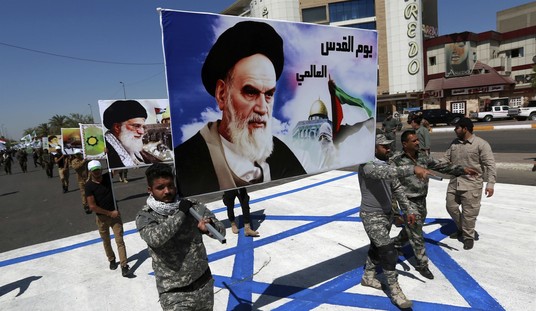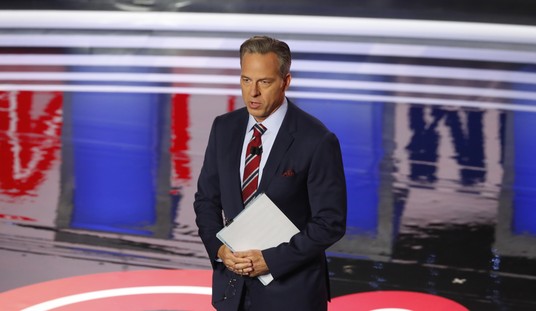This past June, after giving up his right to be prime minister to be able to form a coalition government, and after a fractious year of his party being treated like red-headed step-children in a government they were the larger partners in, Geert Wilders blew the whole thing up after being denied on immigration reforms one too many times. His Party for Freedom (PVV) withdrew its five ministers from the shaky coalition over unfilled asylum policy reform campaign promises made to voters, leaving the remaining members to try to cobble together their own government without PVV's membership.
As they couldn't quite get their act together independently of Wilders, new elections were called for the fall, and today, voters in the Netherlands are going to the polls once again.
Where they had been predicting doom for the populist PVV party thanks to Wilders' precipitous withdrawal and spiking of the previous government - some called it petulant grandstanding - by the end of July, the PVV and its leader were doing the exact opposite and looking pretty strong in Dutch opinion polls. This, even with Wilders saying he had every intention of taking the prime minister's slot this time around if they won.
Dutch far-right politician Geert Wilders’ Freedom Party (PVV) is projected to be the biggest in the October parliamentary election, a July poll said.
The Freedom Party is expected to receive 27 out of 150 seats, according to a survey conducted by Ipsos I&O Research released on Wednesday.
However, the leader of the Christian-Democrats, Henri Bontenbal is emerging as a potential prime minister as his party catches up, according to the poll. The premier in the Netherlands needs to secure the backing of a majority, often in a coalition, which the far right is unlikely to be able to cobble together for Wilders.
The GreenLeft–Labour alliance and the Christian Democrats (CDA) party are both seen taking 24 seats.
I'm not sure who the BBC is talking to today, but I'm not seeing anything about a 'decline' in Wilders' hopes from anyone but them. You will, however, notice the consistent pattern across all of these European parliamentary elections in the threats from the other parties prior to the election - they have flat-out said they won't work with Wilders at all.
There is a cordon sanitaire being thrown up around every populist party and between every citizen's vote and what they actually voted for.
Despite clearly winning the last election, Geert Wilders was not elected prime minister.
— The Inquisition (@inquisition23) October 29, 2025
The left wing parties fractured into smaller groups and collectively voted against him in a coalition.
This time they have ruled out working with him entirely, despite his party being… https://t.co/7n0apo4KNg
...This time they have ruled out working with him entirely, despite his party being likely to receive the most votes for a second election in a row.
So a man who wins two elections won’t be prime minister.
Notice parallels with Your Party, Greens, SNP, Plaid Cymru, etc in the UK.
It is desperate measures from the left. They know they are outnumbered and are now engaged in preventative passive politics.
As it stands now, the system is so damn rigged, it's mindblowing.
...However, under his country's voting system, he [Wilders] could be barred from sweeping to power.
In the Netherlands, every 0.67 per cent of the nationwide vote yields one MP to sit in a 150-seat House of Representatives.
No single party ever wins a majority, and governments must win a confidence vote in a Parliament of 15 or more parties before taking office.
Like in France, a coalition could form to keep out Mr Wilders's PVV.
But as someone in the comments on the GB News story notes, how long that situation remains is anyone's guess. Everyday Europeans are about over it.
The EU tactic of trying to keep the biggest parties on the right from power by forming a centre-left coalition is causing widespread anger.
Good luck Geert Wilders and the PVV.
For all the supposed exhaustion over Wilders' unending harangues about the immigration issue and his somewhat softened but still hardline stance on asylum and nationalistic appeals, many Dutch are with him and want the problem addressed.
So they keep voting for PVV, hoping, somehow, someday, maybe the government they eventually get will act on it before it swallows them whole.
Hans Schreurs, 66 and the owner of an old-fashioned snack bar in the Dutch town of Venlo, is doing well for himself. Business is booming, he owns his home, and he and his wife are locally famous for their deep-fried breaded eggs, known as friet-ei.
Still, Mr. Schreurs says he worries that his grandchildren are competing with immigrants for their own shot at prosperity. That he is why he plans to vote for Geert Wilders and his far-right Party for Freedom in Wednesday’s parliamentary election.
“This country is getting too full,” said Mr. Schreurs recently, speaking from behind the counter of his automat-style fry shop, Automatiek Piccadilly.
The 'traditional parties' are trying to appeal to these people to woo them away from voting for PVV entirely. That would save them from having to strike deals that isolate a party that rates power by its popular showing in the vote totals, but with whom those same parties have no intention of dealing.
Disenfranchising voters over the singular issue driving the election does not seem to be a concern.
...Nevertheless, it is immigration—more than climate or the green economy—that has dominated the final stretch of the campaign. The Dutch asylum system remains overwhelmed, and many municipalities refuse to open new reception centres. Wilders has capitalised on this discontent with his slogan “This Is Your Country!,” summarising his promise to close the borders, suspend the right to asylum, and “give control back” to Dutch citizens. Although he has withdrawn earlier proposals such as banning the Quran or closing mosques, he still maintains that Islam represents a threat to European culture.
Traditional parties are trying to counter that message by appealing to consensus. Timmermans insists that “one cannot govern from resentment,” while the liberals of the VVD seek to recover disenchanted urban voters, and the Christian Democrats of the CDA struggle to stop their steady decline. However, all parties—from left to centre—have reiterated their veto on any coalition with Wilders. The same dynamic can be observed in France, Austria, and Spain.
Beyond the percentages, these elections confirm a change of cycle. The Left is trying to reconnect with the ordinary voter, but it is doing so on the terrain the Right has been defining for years: immigration, security, and national sovereignty. The question is not so much whether Wilders will win—the polls already assume he will—but whether the other parties will be able to continue governing against a growing part of society that no longer feels represented by the liberal-progressive consensus.
Another of the opposition parties' leaders was dismissive of Wilders' populist leanings, choosing to work both ends against the middle as classic Leftists do.
...Rob Jetten, leader of the center-left D66 party that has risen in polls as the campaign wore on, said in a final televised debate that his party wants to rein in migration but also accommodate asylum-seekers fleeing war and violence.
And he told Wilders that voters can “choose again tomorrow to listen to your grumpy hatred for another 20 years, or choose, with positive energy, to simply get to work and tackle this problem and solve it.”
Positive energy is always the answer, said the handsome young Leftist and D66 head named Rob Jetten, who found himself climbing in the polls,
All pretty young Leftists sound the same.
Wilders answered the accusation of 'not solving this problem' that his solutions had never been implemented, as his party had never been allowed to govern as it was elected to do.
There is a lot of work to do for whichever party prevails, and the wrangling that precedes the formation of a Dutch government can last for months, only compounding the misery.
...For almost half of Dutch voters, the housing crisis is top priority, with a shortage of almost 400,000 homes, in a population of 18 million.
Housing has taken stage in the election, and although Wilders has blamed the crisis on migration, others point to a rise in single-person households and planning gridlock.
Most of the parties have vowed to tackle the issue head-on. Frans Timmermans promises at least 100,000 new homes per year if his party takes office, while Rob Jetten of the liberals says the solution lies on building on 1% of agricultural land.
Unemployment hit 4% last month, which is low in European terms but the highest rate for four years in the Netherlands. The number of people claiming unemployment benefits rose 8.8% over the past year, signalling growing anxiety among workers about job security.
And in kind of a funny juxtaposition, the gloomy BBC Xweet about which talks about Wilders' hopes 'declining' appears in the same search as the BBC Ukraine's article detailing how the Netherlands is 'drifting right.'
The Netherlands is holding parliamentary elections — again, early, the third in four years. Polls predict success for Geert Wilders' right-wing populist Party for Freedom. And although the far-right has very little chance of forming a coalition, they have managed to radically change the political landscape and agenda in the country. How did the era of liberal pragmatism in Dutch politics end, and what does NATO Secretary General Mark Rutte have to do with it?
Polls show that Geert Wilders' Party for Freedom (PVV) — a one-man far-right party — could win up to 30 of the 150 seats in the lower house of parliament, becoming the largest force for the second time.
Whose nerves are the BBC trying to calm with the two-sided coverage? Someone in Brussels, perhaps?
The rest of the piece is mostly a paean to former Prime Minister Mark Rutte, now NATO Secretary General. I guess they miss him.
In any event, polls close in a few hours.
For the sake of The Netherlands let's hope Wilders wins.
— Nile Gardiner (@NileGardiner) October 29, 2025
Geert Wilders banks on migration gamble in Dutch election https://t.co/zvFe4DjImv
We'll know soon enough how popular the populist is.
Beege UPDATE:
Well, the polls are closed and the exit poll is in, and it's starting to look as if the pretty young face has taken the win. Wilders' PVV is coming in second, which means he won't have a voice at all. They'll ice them out completely. Von der Leyen has to be drinking heavily in celebration.
Liberal D66 in the lead in the exit poll in the Netherlands. Wilders (PVV) paying the price for collapsing the government and a bad campaign, falls back to second. pic.twitter.com/N3AezhNnaU
— Pepijn Bergsen (@pbergsen) October 29, 2025
D66 has won the Dutch General Election, Party Leader Rob jetten is set to become the next Prime Minister of the Netherlands. pic.twitter.com/JxZ9hCQRY6
— MenaLive (@MenaLive_) October 29, 2025








